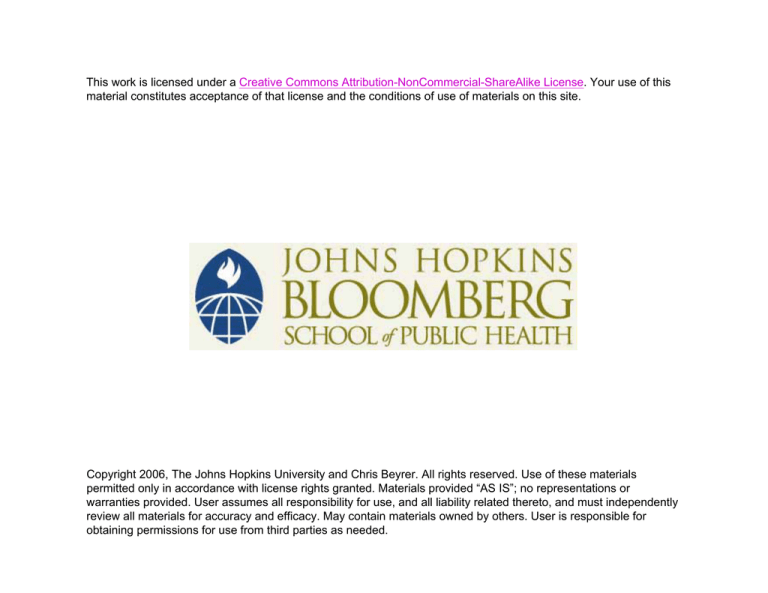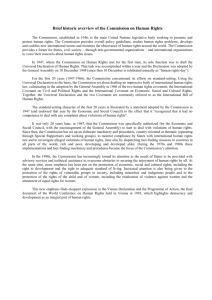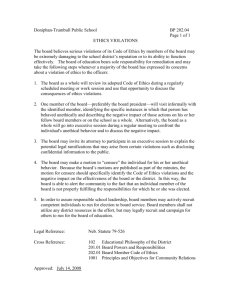
This work is licensed under a Creative Commons Attribution-NonCommercial-ShareAlike License. Your use of this
material constitutes acceptance of that license and the conditions of use of materials on this site.
Copyright 2006, The Johns Hopkins University and Chris Beyrer. All rights reserved. Use of these materials
permitted only in accordance with license rights granted. Materials provided “AS IS”; no representations or
warranties provided. User assumes all responsibility for use, and all liability related thereto, and must independently
review all materials for accuracy and efficacy. May contain materials owned by others. User is responsible for
obtaining permissions for use from third parties as needed.
Research Ethics and Human
Rights
Dr. Chris Beyrer
Depts. of Epidemiology and
International Health
Johns Hopkins School of Public Health
Section A:
The Universal Declaration of
Human Rights
3
Human rights and research
ethics
Human rights and research ethics
share the same roots in Nazi Germany
Universal Declaration of Human Rights
passed by United Nations on December
10, 1948
– Defines the human rights of persons
and violations of those rights
– A universalist document
4
Universal Declaration of
Human Rights
Important resolutions include:
Article 4: Prohibits slavery
Article 5: Prohibits torture
Article 18: Freedom of thought
Article 19: Freedom of opinion and of
expression
Article 25: Standard of Living (includes
access to medical care as a human
right)
5
Universal Declaration of Human Rights:
A universalist document
Importance of being a universalist
document
Recent challenges to the universalist
characteristics include:
– the Declaration is a tool of the West
or U.S.
– Challenges to what is a fundamental
right (respect for authority, right to
work, ect)
6
Universal Declaration of Human Rights:
A universalist document (cont.)
The Declaration originated from two
events:
– The atrocities of Nazi Germany
– Reaction to European colonialism
• Asian and Africa governments
insisted during the drafting of the
Declaration that their people
shared the same rights as
colonialist
7
Section B:
The interaction between human
rights and research ethics
8
The interaction of human rights
and research ethics
Gross abuses of research ethics can be
human rights violations
– ex: offering an experimental drug to a
patient without their informed consent
Human rights violations may lead to health
risks and health problems that need to be
investigated to document both the health
problems and human rights violations
9
Human subjects research with those
whose rights have been violated
Under what context can the rights of human
subjects whose human rights have been violated
give informed consent?
When would the study propose an unacceptable
level of risk?
When would it generate no expected benefit?
Who can review the ethical premise of the
research?
How can you best protect the study subjects and
field teams?
10
Human subjects research with those
whose rights have been violated (cont.)
Do we have an ethical obligation to conduct
research on those whose rights have been
violated?
Is it too difficult to ensure the safety of subjects,
colleagues, ourselves?
Are there circumstance where we could not
ethically conduct research?
11
Section C:
Case Study:
A U.S. Women’s Jail
12
Health and Rights Issues
Local Women’s Jail and Detention
Center have poor standards health
care, hygiene, nutrition
Lengthy time delays from entry to
receiving medication
High prevalence of HIVIV/AIDS,
substance use, mental health dx,
Question from legal group around time
delay for ARV drugs (average 3
months)
13
Ethical concerns in research
in prisons
Potential for exploitation
Questions about ability to give consent
Harm: retribution from guards, staff,
other prisoners
Expectation of benefits may be low
14
Human Rights Considerations
Detainees are denied many human
rights
Denial of medications in prison is a
violation of right to health
Systematic delays in health services
are a state failure to protect rights
Inmates do have the right to see legal
counsel
15
Human Subjects Protections
Approach
Lawyer’s group working on women’s
rights issues in prison told us that the
Warden and Prison officials would
never agree to an evaluation of health
services
We argued that the research into health
services and access needed to be done
Discussions with women after detention
found strong support for going forward
16
Research Approach
Confidential interviews done in the
context of attorney-client meetings
Attorneys trained to do interviews
No permission sought from authorities
Privately funded
JHU CHR asked to review study, with
full disclosure that permission was not
being sought
17
CHR Process
PI requested meeting with the IRB Chair
Discussion focused on risks vs benefits
Main benefit question was about realistic
expectation that study results could lead to
reform, and better health services
We argued that we would use the data for
advocacy for the women, and others in
detention
Study approved in Fall 2004, completed
April, 2005.
18
Table 3. Among Incarcerated women reporting a medical condition,
n=55
Are you receiving treatment or medications for
(this/any of these) condition(s)?
Yes
No
39 (70%)
16 (30%)
Do you still have a medically diagnosed condition?
Yes
More than one
No
35 (64%)
10 (18%)
10 (18%)
Has jail affected access to medications?
Yes
No
29 (53%)
24 (44%)
Have you developed a new medical condition or
serious injury?
Yes
No
17 (35%)
31 (65%)
19
Num ber of days incarcerated
without m edical treatm ent
300
Mental Health
178
224
6
individual wom en
35
150
Infectious
180
46
224
210
90
35
150
Chronic
180
45
178
224
210
0
50
100
150
200
days
250
300
350
20
Num ber of days incarcerated
am ong HIV+ wom en
in d iv id u a l w o m e n
180
Delays in receiving
43
21
14
150
Missed
dosages
21
Discontinued use
6
43
35
0
20
40
60
80
100
120
140
160
180
200
days
21
How has incarceration affected access?
10
Discontinued
Missed dose
Delayed
No affect
9
9
8
7
7
Number of women
6
6
5
5
5
4
4
4
3
3
2
1
1
1
1
1
0
infectious
chronic
mental
22
50
Number of sick-call slips
according to medical condition
Infectious,
n=20
40
Chronic,
n=30
n o . o f s ic k c a ll s lip s
Mental, n=19
30
20
10
0
23
Women’s Health Survey
Conclusions
Women with chronic conditions
– incurred more medical conditionsirrespective of length of stay
– Reported worse access to healthcare
services
– Submitted more sick-call slips
Denial of treatment for serious medical
conditions (chronic, infectious, mental health)
is common
Ongoing violations of the right to a minimum
standard of health
24
Advocacy for change
On June 29th, 2005, DC Council held
hearings on “Health Care in the DC
Correctional Facilities.”
We testified and presented study findings
DC Prisoners Legal Services Project filed a
lawsuit against the District of Columbia for
violations of DC and US law
Dept. of Corrections agrees to hold meeting
to discuss study results, reponses
25
Closing remarks
Important relationships between research
ethics and human rights
There is ethical mandate to investigate
and document the truth of human rights
violations and the subsequent health
problems that stem from them.
26






